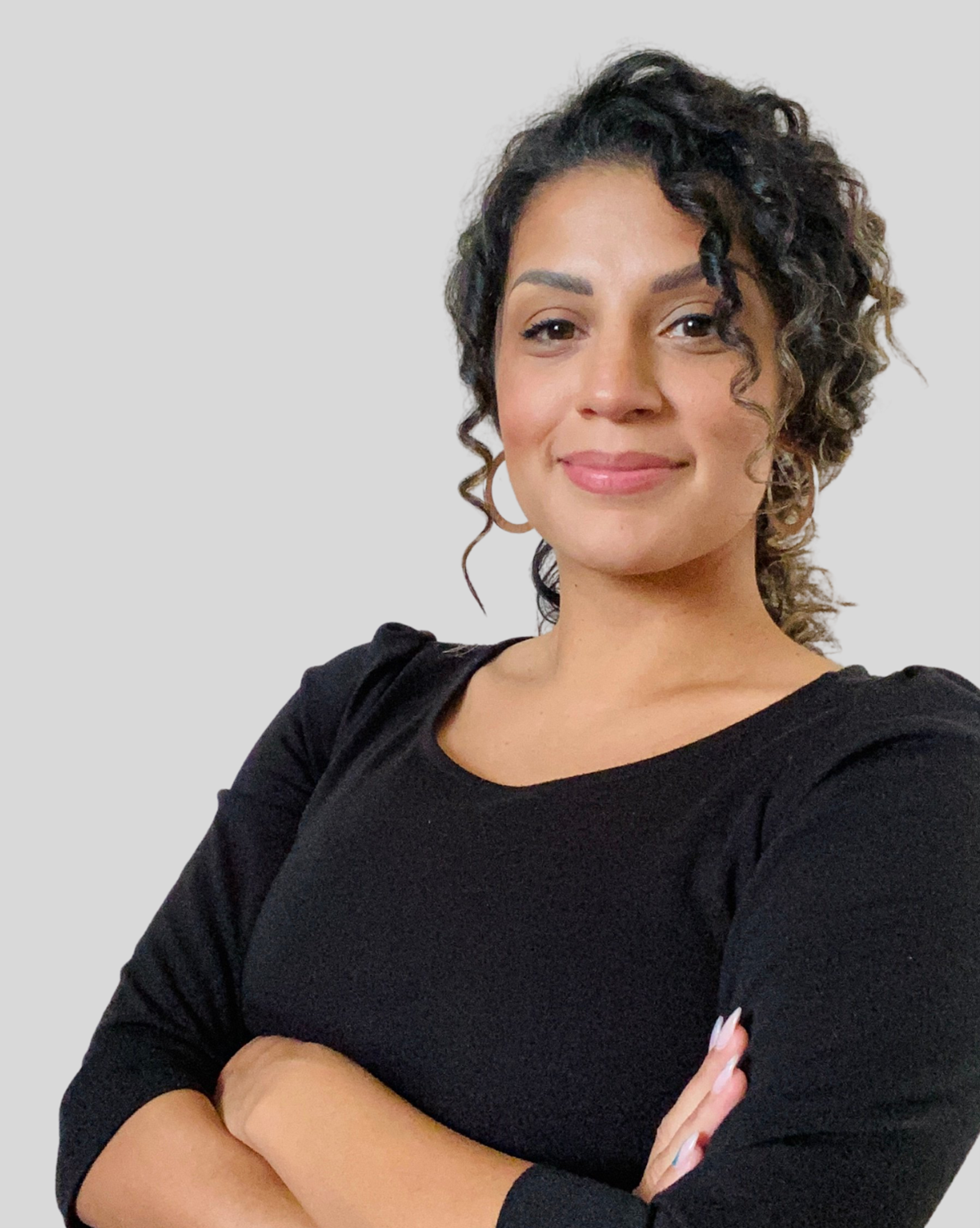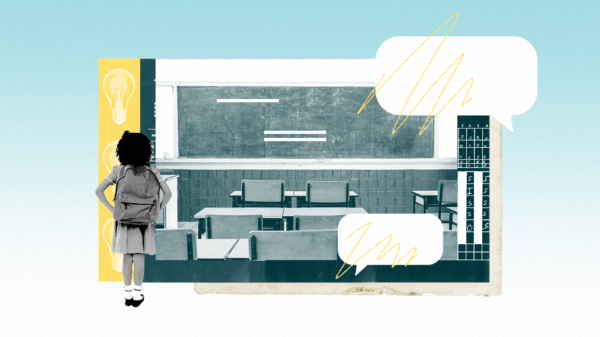Chandra

Leer in Español
Chandra has three daughters. Her youngest is in fourth grade, and her oldest daughters are in tenth and eleventh grade. Most of their lives, Chandra and her family have lived in Idaho and have attended schools in the Nampa School District. As Chandra shared, her daughters have always excelled in their academics and extracurriculars, including basketball, softball, and soccer.
Chandra herself attended Nampa High School, but she did not receive the support and mentorship she needed to stay in school, so she dropped out. Based on her experiences, she has always been a very aware and involved parent. This includes constantly advocating for her daughters, who have been surveilled and treated differently when it comes to discipline. As Chandra reflects on her own and her daughters’ experiences today, it’s like “having déjà vu.” After repeated experiences of different treatment in Nampa High School, Chandra’s middle daughter opted to enroll in online school.
Chandra is also an Instructor in the Department of Sociology at Boise State University, a Doctoral Student at the University of Maryland, and has published research on mothering multiracial children.
*The following interview has been edited for clarity.
Has your youngest daughter been treated differently when it comes to discipline in Nampa schools?
Chandra shared with us a disciplinary experience her youngest daughter had this past year as a fourth grader. As Chandra explained, another little girl was calling her daughter names because her daughter would not lend her a stress ball, which she uses because she is on the spectrum.
It’s a little alarming to me because my [youngest] daughter is only in fourth grade and she’s on the spectrum. So, this school year in the fall, I got calls a couple of times from the school about behavior issues. Because of her disability we have to kind of deal with some of her behavior issues in a different way. But she was starting to come into physical contact with other kids. As a parent . . . I took that very seriously. I don’t want my kid hitting other kids at school.
[My youngest daughter said] this little girl was saying really mean things to [her] in the library. She’s like, I can’t say it, it was a bad word . . . I don’t want to tell you I’ll get in trouble if I say the word. I told the principal [the full story]. The principal just told me: no, [the other little girl] didn’t say that.
So already, I'm thinking there is a pattern that I am seeing with my older daughters when they are telling their side of the story. [Administrators are] like, no, she didn’t say that bad word to you. You hit her. And so already, she’s only in fourth grade, and we’re already having this experience of not giving students the benefit of the doubt. And look, I [told my daughter] you cannot hit people, but [even my daughter] knows something about that situation was not right. The way that it was handled, I already think, is leading into the way that my older daughters are experiencing, interacting with administrators.
How have your older daughters experienced different treatment in discipline in Nampa schools?
In December [2022], [my middle daughter] was late to school. I knew that she was late to school because I dropped her off. And you know anybody who is running around trying to get three kids to school before work--if you're already late, it's a hectic morning. So, I drop[ped] her off at school. She’s late. She's walking to class. She runs into a security guard because Nampa has like three or four, and they say, hey, where are you going? [My daughter] has a history of being harassed and just bugged by administrators and security. So, she responded in an “unkind way.” It is the way that the Dean referred to it, that [my daughter] responded in an unkind way to the Security Officer, and was like, I’m going to class, leave me alone. I’m not skipping. I'm going where I’m supposed to go.
So, she was given lunch detention. She had never had lunch detention before, so she apparently went to the wrong room, [and] the Dean didn’t see her at detention. And now said, okay, you’re going to be suspended because you didn’t show up to detention. I’m getting like three voicemails. I’m at work, I teach, so I can’t pick up my phone and so I call the school.
I sit down and I have to mentally prepare [myself] again to do this song and dance of advocating for my kid, which of course, I don’t mind doing. But unequal treatment like this is just not okay. I'm taking time away from work. She did go to detention. She did check in with an office aid and before [the Dean] checked with anybody, before he even talked to my daughter and [asked], “Did you go to detention? Who did you talk to?” He skipped straight to suspension.
But over time I am like no. If they say something, give them the benefit of the doubt. And he was like, oh, you're right, but I'm still going to give her detention, so I had to fight for her to not be suspended. The number of times that I've had to do something like this. She hasn't been suspended because I'm always stepping in.
Chandra also shared another instance where her daughter was surveilled through cameras at school after another mom called in about a verbal confrontation between various students. As Chandra shared, although her daughter was with a group of friends, but not part of the incident, she was the only one removed from class. This, along with other experiences of surveillance and different treatment caused her middle daughter to feel pushed out and she transferred to online school over the winter break.
What was the school’s response when you let them know your daughter would be transferring to online school?
I told the [administrators] I'm removing my daughter from this school, and I want you to know why. I told him what happened, and [it was] very naive of me to think that he would have cared. He was just like, “Okay. Sure, you can remove her from school, and you can take her to Nova thanks for letting us know,” was [their] response.
I told them you are pushing kids out. You’re treating them very disrespectful and not well. They aren't having a good educational experience. You want them to either go to a different school, to drop out, and to become Nampa [Police Department’s] problem. And essentially that's what happened from his perspective, she's removed from the school. [They] no longer have to “deal with her.”
That's what they're doing to all these kids. They're trying the best they can with what they have, and the school is finding technicalities and roadblocks to be like. You can’t be here, and if you leave, we don't care. We would actually prefer that, you know.
Why do you think your daughters have been treated differently at school?
I'm a sociologist, and sometimes I can be a little pessimistic, but in my heart, like I truly believe that a lot of our administrators and just people in this State, and you know, in the United States at large really do have such an internal bias. My daughters have very traditional, long Mexican names. You’d look at [my youngest daughter’s] name, and she has this very long name, and has a documented disability. And sometimes I wonder . . . I didn’t notice it happening with my older daughters until they were older in school.
Sometimes I feel like you just see them, you know, like little kids of color, and just assume they’re naughty. You know that they’re not following the rules, or they’re extra rambunctious and that’s just the way the interactions are happening. Nobody [is] saying those words in particular but that’s the way they’re being interacted with.
I would say, for my oldest daughter, the one that’s in eleventh grade, and does more sports, she really hasn’t had a lot of negative experiences at all. But she’s very quiet. She kind of flies under the radar. If she doesn’t like something, she just keeps it to herself, she’s very quiet.
But my middle daughter, who is in tenth grade, is the one who is now doing online school through Nova. So, it’s still the Nampa School District, but it’s online. I feel like she’s had problems in school—it’s been like a consistent thing. And that draws attention to you when you’re, you know, not afraid to say no, that’s not what I said, and I’m not doing that, and that’s not fair. So, I think that that kind of draws a little bit more attention to her.
What do you think needs to change to address Latinx students being targeted and pushed out in schools?
[Schools] need to do an actual needs assessment from the perspective of their students like, how are the students actually feeling? What is it that they particularly want? I think one of the students group did this last year [and] one of the main things that students were saying [is] that they are not represented in their curriculum; that when their teachers teach certain curriculum that certain things are not taught and that they are represented, or that their teachers teach it really poorly and push really racist or bias tropes without even realizing it. [This] is making students feel othered.
Or, you know, in the classroom, I'm sure that students will probably also tell them that they're not having good experiences with security, etc. And you know, I don't think that training really is a viable option.
It's good spirited and maybe it can do something, but there needs to be a change in administration, if we have administrators blatantly telling us the way that they are racially profiling our children, they cannot be trusted with their social, emotional, and academic safety. I don’t know how to deal with that, but we can't just give them a [Diversity Equity and Inclusion], and they're going to suddenly be able to humanize our students.
I have been there, and I have gone through all of the hoops, and nothing is changing. So, removing my child from the school is the best solution, which is not a good solution . . . not an equitable solution. Not all kids have a parent who can be home or has good Internet or has a parent who has the time to deal with the school at the level that I have over the last year, and be able to realize and be confident enough to advocate for their kid in that way, and not that they don't want to, [it’s] the amount of emotional labor and privilege that that entails.
The Education Equity for Latinx Students project started in the fall of 2022 as part of our efforts to expand racial justice work on behalf of Idaho students, beginning with Latinx communities.
Read more stories and learn about the Education Equity for Latinx Project


